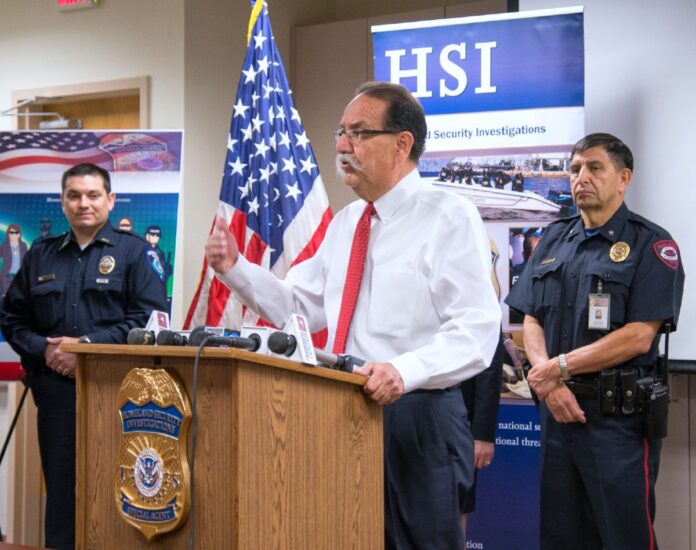HARLINGEN – With child exploitation cases increasing by more than 700 percent in South Texas since 2003, federal and local law enforcement officials yesterday announced a new task force to ramp up their fight against sexual predators.
The new partnership with local law enforcement in the Valley will pool resources to better investigate crimes committed against children, officials said. It will be called the Rio Grande Valley Child Exploitation Investigations Task Force, or RGV CEITF.
Task force members include U.S. Immigration and Custom’s Enforcement’s Homeland Security Investigations, the U.S attorney’s office, Cameron County district attorney’s office, the Harlingen and Brownsville police departments, the Cameron County sheriff’s office and the Brownsville Independent School District Police Department.
“We stand 100 percent behind this task force,” said Hector Leal, deputy chief of the Harlingen Police Department.
The formation of the task force is a continuation of the ICE initiative called Operation Predator, which went into effect in 2003. Since then, federal officials say, complaints to the National Center for Missing and Exploited Children are rising “at an alarming level.”
In the San Antonio field office area of responsibility, which includes the Rio Grande Valley, the number of child exploitation cases has reached an all-time high.
In 2003, Homeland Security Investigations initiated 12 child exploitation cases that resulted in eight arrests. The number of new cases initiated by HSI in 2015 rose to 100 cases. Those cases led to 53 criminal arrests for child exploitation.
“The major component of this effort will be a force-multiplier effect, increasing our collaboration and our communication and the sharing of our resources and capabilities,” said Kevin Benson, assistant special agent in charge at Homeland Security Investigations in Brownsville.
Cameron County District Attorney Luis Saenz said the agencies involved in the new task force already share information on child exploitation. But he said the new partnership is an acknowledgement that the culture we now live in also has changed.
“Growing up, as many of you all did from a large family, back in the 50s and 60s, I remember my mom would gather all the kids about 5, 7 or 8 o’clock at night and she’d bring us in the house. And I remember her locking the front door, and at that point she felt, “OK, I’ve got my kids safe in my house. The front door is locked.’”
Saenz continued.
“These days as you know, when that happens, the kids go into the bedroom and close the door, and with this right here, the perpetrator’s in our bedroom,” he said. “So this is a very, very good tool to attack the predator that’s coming into the house, into the bedroom, where even when the parents are there, they can’t protect them anymore.”
The new task force will focus some of its efforts on policing child exploitation on the Internet as well.
Homeland Security Investigations is one of the founding members of the Virtual Global Taskforce, an international alliance of law enforcement agencies and private industry partners that work together to prevent and deter online child sexual abuse.





